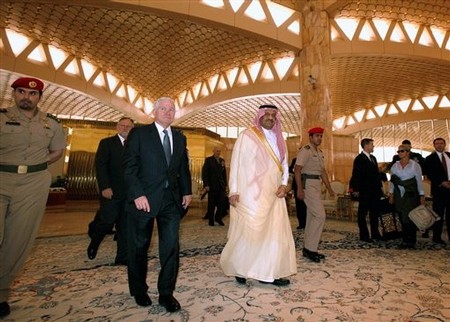Saudi ties and the Arab Spring

It's ironic that on the day President Obama is set to give a talk highlighting American policy toward the Mideast in light of the "Arab Spring," the AP reports on expanding U.S.-Saudi defense ties and cuts the legs out from anyone hoping the administration was going to embrace democracy for the region.
Writes Robert Burns:
Saudi Arabia is central to American policy in the Middle East. It is a key player in the Arab-Israeli peace process that President Barack Obama has so far failed to advance, and it is vital to U.S. energy security, with Saudi Arabia ranking as the third-largest source of U.S. oil imports. It also figures prominently in U.S. efforts to undercut Islamic extremism and promote democracy.
One wonders how that final sentence got into this report. Saudi Arabia is one of the principle ideological progenitors of the radicalism that the U.S. is combating. It was America's protection of Saudi Arabia (stationing troops there to "contain" Saddam's Iraq) that spurred bin Laden to turn his jihadist guns on the U.S. Far from "undercutting" extremism, America's embrace of Saudi Arabia has propelled it.
And it's absurd on its face to suggest that Saudi Arabia - a monarchy - somehow figures in "democracy promotion" efforts. One need only see how Saudi Arabia reacted to uprisings in Bahrain to understand how the kingdom views pro-democracy protests.
As to the merits of expanding and deepening America's defense ties to Saudi Arabia, who knows. Maybe if the U.S. declined to help Saudi Arabia defend its oil fields from terrorists and loosened the six decade defense relationship, the kingdom would collapse, oil prices would skyrocket and the civilized world would be forced to eek out a miserable existence in a Mad Max-style post-apocalyptic dystopia. Or maybe the Saudis would get on with life and find a way to keep selling the oil they need to keep their country afloat.
Either way, the fact that neither the administration nor the Saudis are eager to publicly discuss what it is they're doing should be proof enough that whatever President Obama says about U.S. policy towards the Middle East isn't quite the whole story.
(AP Photo)



